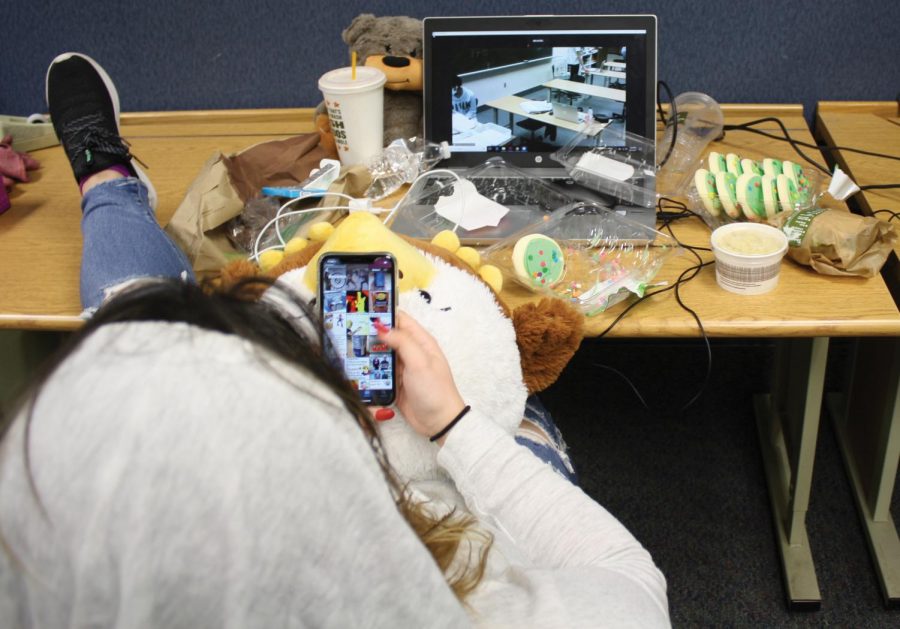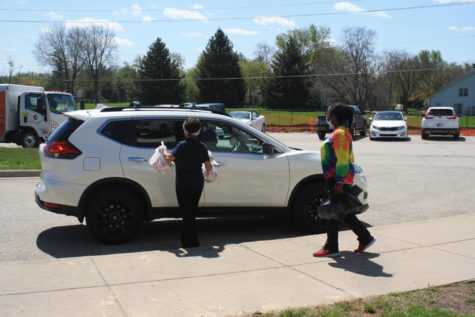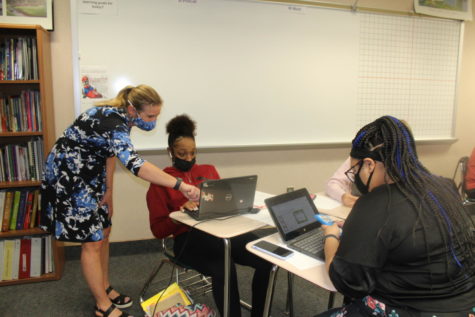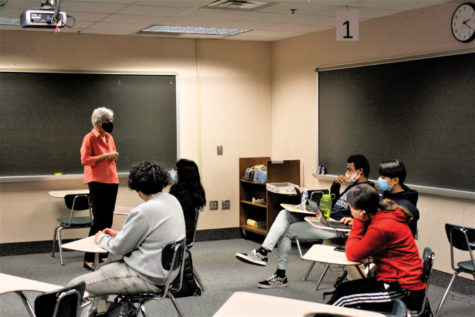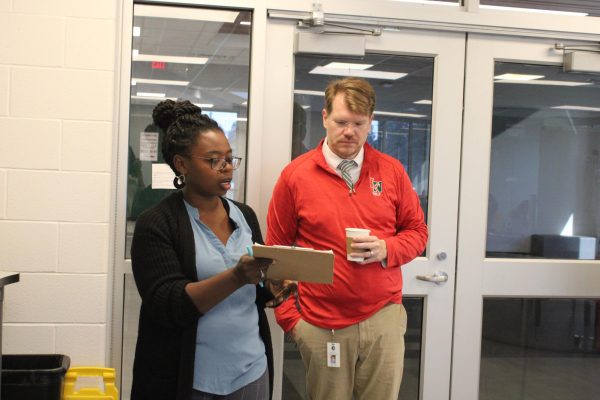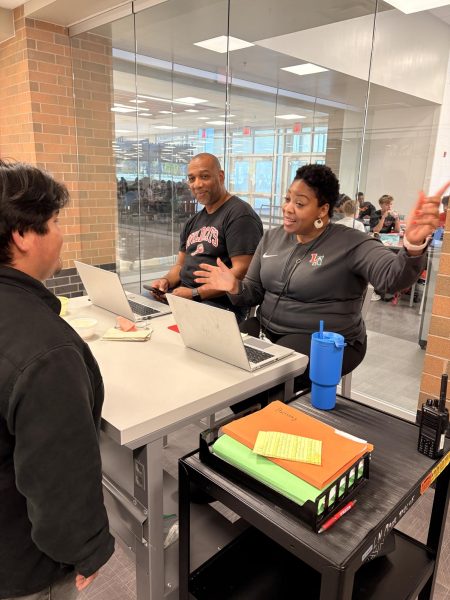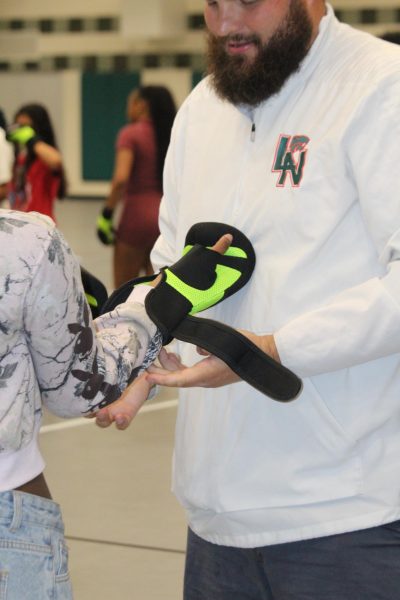Virtual learning causes physical changes
Due to virtual learning, students have developed new unhealthy habits when it comes to sleep, eating, and social media usages
With the transition from in-person to virtual and hybrid learning, teachers and students have been developing new habits, bad and good. Freshman Clara Shepherd is one of these people, and she has noticed drastic changes since she began her virtual school year at LN.
Shepherd has been adjusting to not only virtual learning, but her first year attending LN. She faces different daily routines and habits depending on if she is going into school or not. One of the major changes she has noticed is her diet. She finds herself eating more when she is at home zooming into school.
“I’m eating a lot more junk food and snacking more. I’m eating more than I used to be because I have nowhere to go so I’ll just be sitting at home bored. I’ll go get a snack or something,” Shepherd said.
While Shepherd’s eating habits have changed due to boredom, there are multiple reasons for habits to change. Sadness and depression can cause students to resort to food for comfort.
“I think a lot of it is our responses to what we feel like we can do, what the limits on us are. If we feel like we’re stuck inside, either because of school or weather or other reasons, it becomes real easy for us to do things like eat more and gain more,” psychology teacher Larry Leonhardt said. “When some people are in a low mood they eat more. They eat more of certain foods, comfort foods. There’s something biological about that, and in a way, they actually make us feel better.”
Another habit Shepherd has developed is spending most of her time in her room. She noticed that with spending more time in her room she hasn’t been as active or as close to her family as before, and she is trying to change.
“I’ve gotten a lot further from my family. I feel like a lot of it is being isolated in my room and I’ll be on FaceTime with my friends the whole day, so I don’t talk to them as much. I’m a lot more kept to myself than I used to be,” Shepherd said. “I’m trying to get out of bed more. I’ll go downstairs more and I’ll go outside for a few minutes, little things like that.”
Shepherd has noticed that with the new lifestyle of keeping to herself in her room, her social media usage has increased also. She’s finding it easier to get distracted when she’s learning through a screen from her room.
“I’m on social media what feels like the whole day. I’m on it a lot more than I used to be just [from] being on social media a ton during class and not paying attention as much. I didn’t used to do that. I couldn’t. They’re habits that are kind of hard to get out of,” Shepherd said.
Shepherd isn’t the only one facing the habit of increased social media usage. Junior Marcela Rosales-Harms also finds herself struggling to put her phone down during class.
“I use [social media] more, but I care less. It’s just absent scrolling because I’m bored. [I use it during class] when I’m online but not in person at school,” Rosales-Harms said.
Leonhardt believes that back in August and September things were hectic, but since then we should have begun to develop new habits from things we’ve done so many times. He thinks that even though we’re developing new neuron connections, the old ones are still there.
“Everytime you learn something new, neurons connect with one another. The more you fire those connections, the more you do something, the easier it becomes for them to fire, and at that point it’ll become a habit,” Leonhardt said. “If we’ve been doing something long enough, some of our different ideas get grooved into our system. You don’t have to think about them as much, they just happen in the right circumstance. The neurons have fired together so they’re more tightly linked.”
Along with an increase in screen time, Rosales-Harms has noticed a decrease in the amount of sleep she is getting. Like Shepherd, she is doing what she can to get her schedule back on track.
“I end up going to sleep later and sleeping less in general. Sometimes it’s from doing homework late at night, but stress also makes me sleep less,” Rosales-Harms said. “I take some melatonin at night and try to stay on a consistent routine for homework time, relaxation time, and sleep time.”
Along with Rosales-Harms, Leonhardt has developed habits of his own since the beginning of COVID-19.
Even though he struggles to maintain them, he is thankful that he’s been able to develop good habits during his time facing the pandemic.
“On the positive side I know for me I did a lot of walking last spring, and when the Y opened up at the beginning of June I started going in there all the time. It’s become a habit for me. It’s a good habit. I come back to school and I get busy again, I don’t feel good if I don’t go to the Y,” Leonhardt said.
Leonhardt says that developing healthy habits and overcoming old ones can be hard, and that relapse is a significant part of the process. Even if the habit seems small, there’s almost always going to be a time where a person instinctively goes back to their old habits.
“Relapsing is a part of changing habits. Those old connections are still there. They’re going to fire every now and then,” Leonhardt said. “Just accept that as, ‘I took a step back, now let’s take a step forward again’. Set yourself some goals, and stick to them as best you can.”
Shepherd is doing her best to develop healthier habits. She acknowledges that there will be struggles, but she is determined to continue taking steps forward.
“Knowing I am not alone and that other people are going through the same thing as me has helped me a lot,” Shepherd said. “It’s been easy to develop bad habits, but once you realize and develop an understanding of things you need to change, it makes it easier to be happier and more determined.”



